Home > Press > Water window imaging opportunity: A new theoretical study elucidates mechanisms that could help in producing coherent radiations, ultimately promoting high-contrast imaging of biological samples
 |
Abstract:
Ever heard of the water window? It consists of radiations in the 3.3 to 4.4 nanometre range, which are not absorbed by the water in biological tissues. New theoretical findings show that it is possible to develop coherent radiations within the water window. These could be the basis of an optimal technique to obtain a high-contrast image of the biological samples or to be used in high-precision spectroscopy. Now, a new theoretical study identifies the physical mechanism needed to efficiently generate the harmonic radiations—which are multiples of an incoming laser's frequency—at high laser intensities that occur beyond the saturation threshold of atoms and molecules. These findings, aimed at improving conventional methods of coherent radiation production to reach the water window, were recently published in the EPJ D by José Pérez-Hernández from the Centre for Pulsated Laser, CLPU, in Salamanca, Spain, and colleagues.
Water window imaging opportunity: A new theoretical study elucidates mechanisms that could help in producing coherent radiations, ultimately promoting high-contrast imaging of biological samples
Heidelberg, Germany and New York, NY | Posted on August 21st, 2014When an intense and short laser pulse interacts with an atom or molecule, one of the resultant physical processes is the High-order Harmonic Generation (HHG) process, which is capable of changing the driving laser pulse into new harmonic frequencies. HHG also provides a direct way to synthesise atto-second pulses (10-18s range) and produce coherent radiation in the extreme UV range, dubbed XUV and EUV.
In previous similar work, studies focused on hydrogen as the atomic target. In the present work, the authors extend the study to argon atoms—a gas typically providing a high enough frequency conversion efficiency to detect the HHG. The authors use the same formalism as in hydrogen studies, consisting in mathematical equations combined with a quantum mechanical approach using numerical computation and providing a quantitative description of the HHG spectrum. The experimental confirmation of the reported prediction, however, still remains a challenge.
####
For more information, please click here
Contacts:
Laura Zimmermann
Springer
Corporate Communications
tel +49 6221 487 8414
Copyright © Springer
If you have a comment, please Contact us.Issuers of news releases, not 7th Wave, Inc. or Nanotechnology Now, are solely responsible for the accuracy of the content.
| Related Links |
| Related News Press |
News and information
![]() Researchers develop molecular qubits that communicate at telecom frequencies October 3rd, 2025
Researchers develop molecular qubits that communicate at telecom frequencies October 3rd, 2025
![]() Next-generation quantum communication October 3rd, 2025
Next-generation quantum communication October 3rd, 2025
![]() "Nanoreactor" cage uses visible light for catalytic and ultra-selective cross-cycloadditions October 3rd, 2025
"Nanoreactor" cage uses visible light for catalytic and ultra-selective cross-cycloadditions October 3rd, 2025
Imaging
![]() ICFO researchers overcome long-standing bottleneck in single photon detection with twisted 2D materials August 8th, 2025
ICFO researchers overcome long-standing bottleneck in single photon detection with twisted 2D materials August 8th, 2025
![]() Simple algorithm paired with standard imaging tool could predict failure in lithium metal batteries August 8th, 2025
Simple algorithm paired with standard imaging tool could predict failure in lithium metal batteries August 8th, 2025
![]() First real-time observation of two-dimensional melting process: Researchers at Mainz University unveil new insights into magnetic vortex structures August 8th, 2025
First real-time observation of two-dimensional melting process: Researchers at Mainz University unveil new insights into magnetic vortex structures August 8th, 2025
![]() New imaging approach transforms study of bacterial biofilms August 8th, 2025
New imaging approach transforms study of bacterial biofilms August 8th, 2025
Discoveries
![]() Researchers develop molecular qubits that communicate at telecom frequencies October 3rd, 2025
Researchers develop molecular qubits that communicate at telecom frequencies October 3rd, 2025
![]() Next-generation quantum communication October 3rd, 2025
Next-generation quantum communication October 3rd, 2025
![]() "Nanoreactor" cage uses visible light for catalytic and ultra-selective cross-cycloadditions October 3rd, 2025
"Nanoreactor" cage uses visible light for catalytic and ultra-selective cross-cycloadditions October 3rd, 2025
Announcements
![]() Rice membrane extracts lithium from brines with greater speed, less waste October 3rd, 2025
Rice membrane extracts lithium from brines with greater speed, less waste October 3rd, 2025
![]() Researchers develop molecular qubits that communicate at telecom frequencies October 3rd, 2025
Researchers develop molecular qubits that communicate at telecom frequencies October 3rd, 2025
![]() Next-generation quantum communication October 3rd, 2025
Next-generation quantum communication October 3rd, 2025
![]() "Nanoreactor" cage uses visible light for catalytic and ultra-selective cross-cycloadditions October 3rd, 2025
"Nanoreactor" cage uses visible light for catalytic and ultra-selective cross-cycloadditions October 3rd, 2025
Interviews/Book Reviews/Essays/Reports/Podcasts/Journals/White papers/Posters
![]() Spinel-type sulfide semiconductors to operate the next-generation LEDs and solar cells For solar-cell absorbers and green-LED source October 3rd, 2025
Spinel-type sulfide semiconductors to operate the next-generation LEDs and solar cells For solar-cell absorbers and green-LED source October 3rd, 2025
![]() Rice membrane extracts lithium from brines with greater speed, less waste October 3rd, 2025
Rice membrane extracts lithium from brines with greater speed, less waste October 3rd, 2025
|
|
||
|
|
||
| The latest news from around the world, FREE | ||
|
|
||
|
|
||
| Premium Products | ||
|
|
||
|
Only the news you want to read!
Learn More |
||
|
|
||
|
Full-service, expert consulting
Learn More |
||
|
|
||








